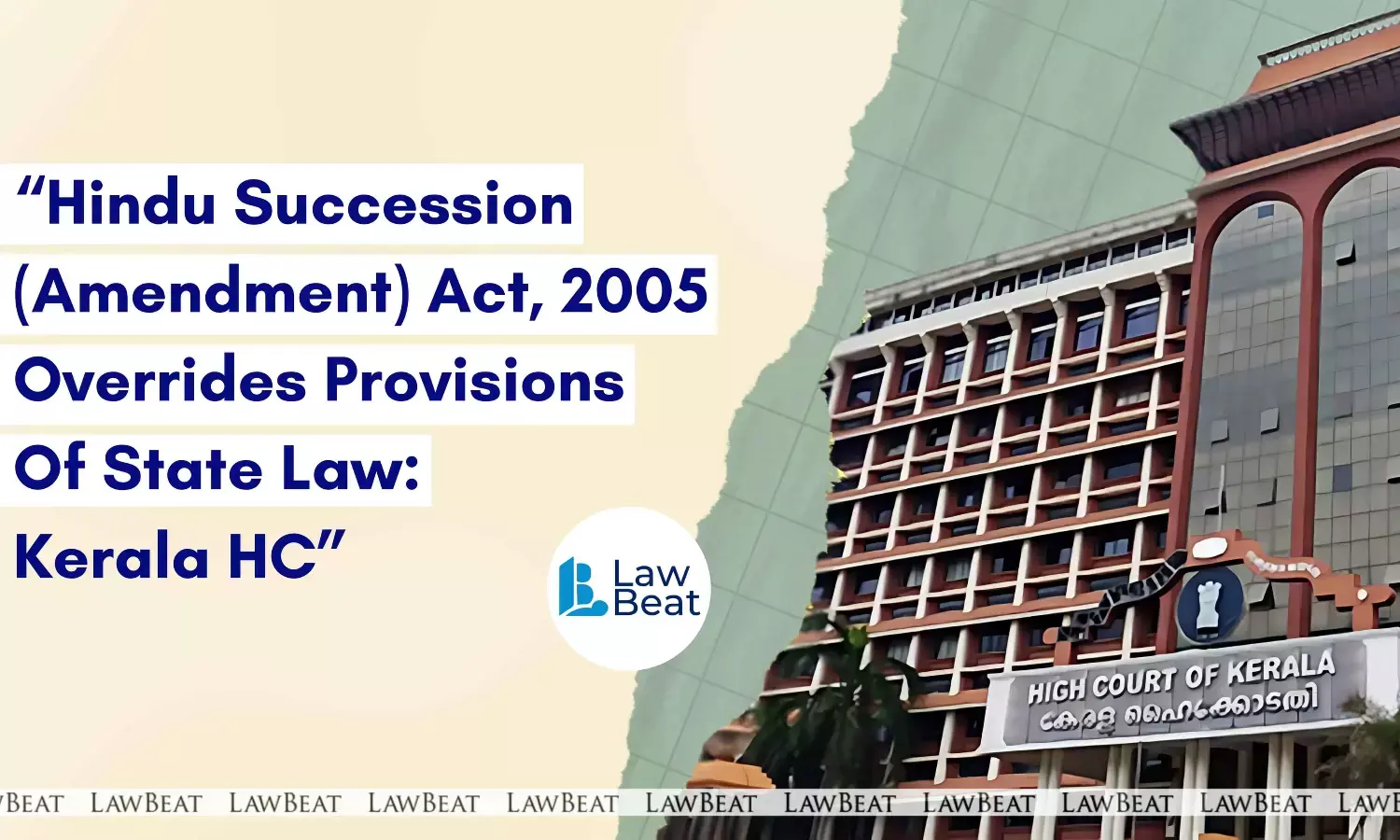“One Daughter Equal to Ten Sons”: Kerala HC Restores Daughters’ Inheritance Rights

In a significant ruling reinforcing gender equality in inheritance, the Kerala High Court has held that daughters of a deceased Hindu male who passed away post-2004, are entitled to an equal share in ancestral property, notwithstanding the provisions of the Kerala Joint Hindu Family System (Abolition) Act, 1975.
The verdict, delivered by Justice Easwaran S. in NP Rajani v. Radha Nambidi Parambath, resolves a long-standing conflict between the Kerala State legislation and the amended Section 6 of the Hindu Succession Act, 1956.
The central issue was whether the deemed partition introduced under Sections 3 and 4 of the Kerala Act could nullify the birthright recognized under Section 6 of the amended Hindu Succession Act, and can an exception be carved out in light of the State Law.
Brief Background
The plaintiffs, Rajani, Ramani, Rajeswari (since deceased) and Rathibha, filed a partition suit (OS No. 231 of 2009) claiming equal rights over the ancestral property allotted to their father Chandu from the Nambidi Parambath Tharawad. The suit was contested by their mother (Defendant No. 1) and brother (Defendant No. 3), who argued that Chandu had executed a valid will in favour of the son and that the daughters had already been married off and thus had no inheritance rights.
The trial court upheld the will and dismissed the suit.
On appeal, the first appellate court held that the will could operate only to the extent of Chandu’s fractional share and allotted 1/12th share to each plaintiff, recognising the daughters’ claim under the 2005 Amendment.
The plaintiffs approached the High Court arguing that they were entitled to a greater share as coparceners, challenging the application of the 1975 State Act.
Court’s Findings
The court extensively examined the apparent conflict between the two enactments.
Section 6 of the Hindu Succession (Amendment) Act, 2005, grants coparcenary rights to daughters by birth, equating them with sons and mandates testamentary or intestate succession rather than survivorship.
The 1975 Kerala Act, particularly Sections 3 and 4, had earlier abolished the right by birth and provided for a deemed partition, converting joint tenancy into tenancy-in-common. However, the High Court found that:
"None of the provisions of the Kerala Joint Family System (Abolition) Act, 1975 expressly abolishes the joint family system in the State of Kerala... Sections 3 and 4, do not indicate that the joint family system stood abolished in the State of Kerala."
The Court held that the state law, while intending to abolish coparcenary, did not succeed in doing so entirely and cannot prevail over the 2005 Central law. Citing the Law Commission’s 174th Report and parliamentary debates, the Court emphasised that Parliament was aware of the Kerala enactment and nevertheless chose to legislate over the same field:
“...the Parliament intended the Act [39 of 2005] to occupy the field of ‘succession’ and ‘joint family’ under Entry 5 of List III of the Seventh Schedule.”
Rejection of Contrary Precedents
The Court declared that earlier single-judge decisions in Babu v. Ayillalath Arunapriya and Kali Ammal v. Valliyammal, which had excluded Kerala from the scope of the 2005 amendment, no longer held good law post the Supreme Court’s ruling in Vineeta Sharma v. Rakesh Sharma, (2020) 9 SCC 1. It noted:
“The Act 30 of 1976 though intended to abolish joint family system in the State of Kerala did not actually do so… The decisions in Ayillalath Arunapriya and Kali Ammal...cannot be said to lay down the correct principles of law.”
Reliance on Vineeta Sharma v. Rakesh Sharma, (2020) 9 SCC 1
The appellants argued that the Supreme Court in Vineeta Sharma had settled the law that:
“A daughter is a coparcener by birth and enjoys the same rights and liabilities as a son... It is not necessary that the father should be alive at the time of the 2005 amendment for the daughter to assert her coparcenary right.” (Vineeta Sharma, para 63–64)
They urged the Court to recognize that the 2005 amendment prevails over any inconsistent State law by virtue of Article 254 of the Constitution, and that Vineeta Sharma affirmed that these rights were substantive, not procedural.
The Kerala High Court, accepted these submissions and held Vineeta Sharma to be decisive.
Justice Easwaran conclusively observed that Vineeta Sharma clarified:
- Coparcenary rights arise by birth, and not upon the death of the father or a predecessor coparcener;
- The survival of the joint family or existence of the father at the time of the amendment is immaterial, so long as the daughter was alive on or after 9.9.2005;
- The 2005 amendment conferred substantive rights that could not be curtailed by pre-existing state laws like the Kerala Act, particularly where such laws did not actually abolish the joint family system in express terms.
Case Title: NP Rajani v. Radha Nambidi Parambath, RSA No. 436 of 2018
